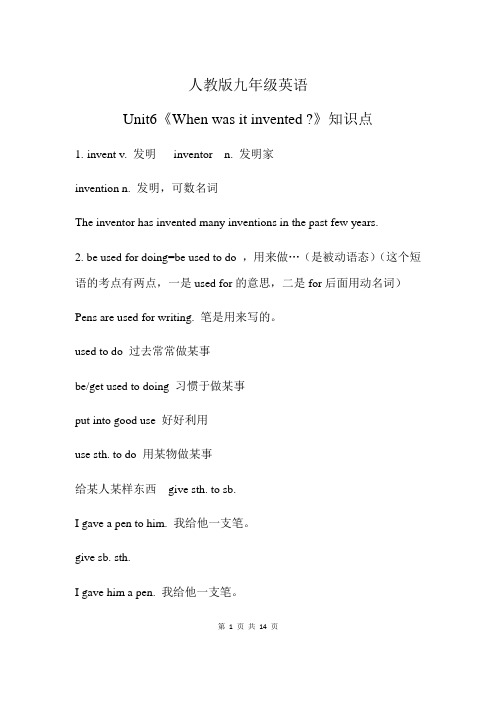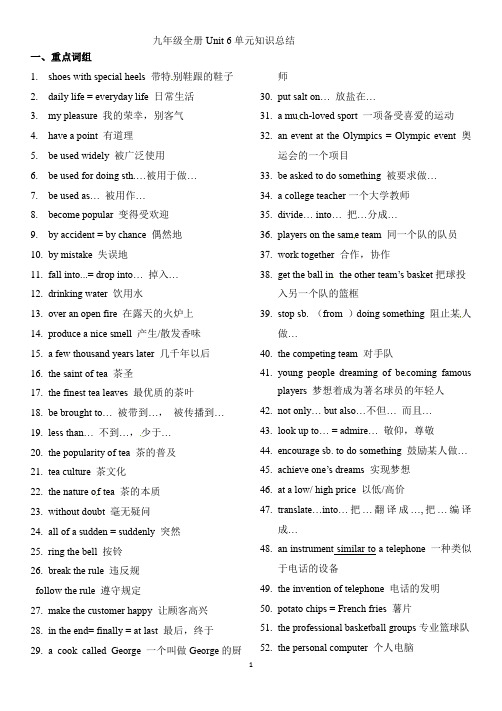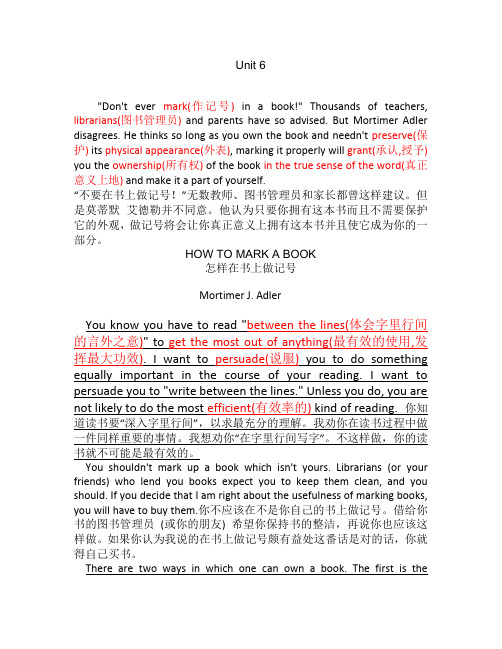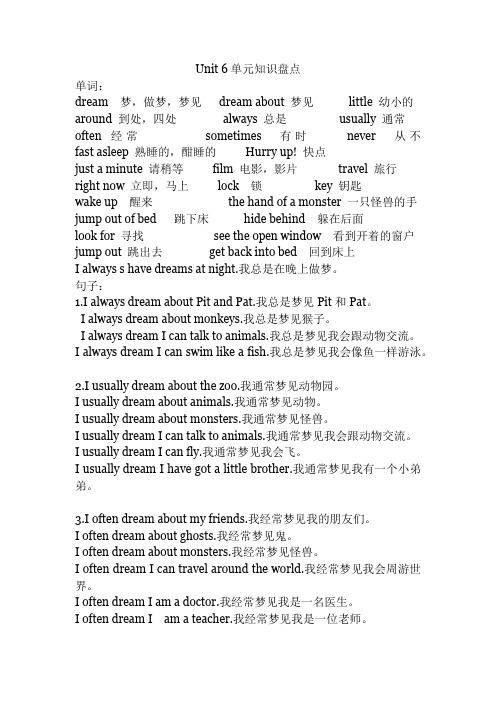Unit 6
人教版九年级英语Unit6知识点总结

人教版九年级英语Unit6《When was it invented ?》知识点1.invent v. 发明inventor n. 发明家invention n. 发明,可数名词The inventor has invented many inventions in the past few years.2. be used for doing=be used to do ,用来做…(是被动语态)(这个短语的考点有两点,一是used for的意思,二是for后面用动名词)Pens are used for writing. 笔是用来写的。
used to do 过去常常做某事be/get used to doing 习惯于做某事put into good use 好好利用use sth. to do 用某物做某事给某人某样东西give sth. to sb.I gave a pen to him. 我给他一支笔。
give sb. sth.I gave him a pen. 我给他一支笔。
第 1 页共14 页pass/offer /send/show/write/bring/sell/lend/serve/ tobuy/cook/make/get/sing/prepare for4. all day 整天all evening/night the whole day5. salty adj. 咸的salt n. 盐sour/sweet/bitter/hot/salty酸甜苦辣咸6. by mistake 错误地(犯错是:make mistakes=make a mistake,这些常见的短语大家务必要掌握)I took the umbrella by mistake. 我不小心拿错了雨伞。
7. by accident/chance 意外,偶然(常见短语,考的最多的是它的意思)I met her by accident at bus stop.我在公共汽车站意外地见到了她。
九年级全册Unit 6单元知识总结

九年级全册Unit 6单元知识总结一、重点词组1.shoes with special heels 带特别鞋跟的鞋子2.daily life = everyday life 日常生活3.my pleasure 我的荣幸,别客气4.have a point 有道理5.be used widely 被广泛使用6.be used for doing sth.…被用于做…7.be used as… 被用作…8.become popular 变得受欢迎9.by accident = by chance 偶然地10.by mistake 失误地11.fall into...= drop into… 掉入…12.drinking water 饮用水13.over an open fire 在露天的火炉上14.produce a nice smell 产生/散发香味15.a few thousand years later 几千年以后16.the saint of tea 茶圣17.the finest tea leaves 最优质的茶叶18.be brought to… 被带到…,被传播到…19.less than… 不到…,少于…20.the popularity of tea 茶的普及21.tea culture 茶文化22.the nature of tea 茶的本质23.without doubt 毫无疑问24.all of a sudden = suddenly 突然25.ring the bell 按铃26.break the rule 违反规follow the rule 遵守规定27.make the customer happy 让顾客高兴28.in the end= finally = at last 最后,终于29.a cook called George 一个叫做George的厨师30.put salt on… 放盐在…31.a mu ch-loved sport 一项备受喜爱的运动32.an event at the Olympics = Olympic event 奥运会的一个项目33.be asked to do something 被要求做…34.a college teacher一个大学教师35.divide… into… 把…分成…36.players on the same team 同一个队的队员37.work together 合作,协作38.get the ball in the other team’s basket把球投入另一个队的篮框39.stop sb. (from )doing something 阻止某人做…40.the competing team 对手队41.young people dreaming of be coming famousplayers 梦想着成为著名球员的年轻人42.not only… but also…不但… 而且…43.look up to… = admire… 敬仰,尊敬44.encourage sb. to do something 鼓励某人做…45.achieve one’s dreams 实现梦想46.at a low/ high price 以低/高价47.translate…into…把…翻译成…,把…编译成…48.an instrument similar to a telephone 一种类似于电话的设备49.the invention of telephone 电话的发明50.potato chips = French fries 薯片51.the professional basketball groups专业篮球队52.the personal computer 个人电脑53.someone else’s idea 另外的人的主意54.lead to … 导致,引起55.It is said that 据说It is believed that人们相信It’s reported that据报道It’s known that 众所周知二、重点语法句式---When was the zipper invented? --- It was invented in 1893.---Who was it invented by? --- It was invented by Whitcomb Judson.---What is the hot ice-cream scoop used for? --- It’s used for serving really cold ice-cream.Unit6基础复习熟记本单元单词、短语、句型;2. 语法复习:过去时的被动语态。
unit 6 课文注解加翻译

Unit 6"Don't ever mark(作记号)in a book!" Thousands of teachers, librarians(图书管理员)and parents have so advised. But Mortimer Adler disagrees. He thinks so long as you own the book and needn't preserve(保护) its physical appearance(外表), marking it properly will grant(承认,授予) you the ownership(所有权) of the book in the true sense of the word(真正意义上地) and make it a part of yourself.“不要在书上做记号!”无数教师、图书管理员和家长都曾这样建议。
但是莫蒂默艾德勒并不同意。
他认为只要你拥有这本书而且不需要保护它的外观,做记号将会让你真正意义上拥有这本书并且使它成为你的一部分。
HOW TO MARK A BOOK怎样在书上做记号Mortimer J. AdlerYou know you have to read "between the lines(体会字里行间的言外之意)" to get the most out of anything(最有效的使用,发挥最大功效). I want to persuade(说服)you to do something equally important in the course of your reading. I want to persuade you to "write between the lines." Unless you do, you are not likely to do the most efficient(有效率的) kind of reading. 你知道读书要“深入字里行间”,以求最充分的理解。
五年级知识点Unit 6单元知识盘点

Unit 6单元知识盘点单词:dream 梦,做梦,梦见dream about 梦见little 幼小的around 到处,四处always 总是usually 通常often 经常sometimes 有时never 从不fast asleep 熟睡的,酣睡的Hurry up! 快点just a minute 请稍等film 电影,影片travel 旅行right now 立即,马上lock 锁key 钥匙wake up 醒来the hand of a monster 一只怪兽的手jump out of bed 跳下床hide behind 躲在后面look for 寻找see the open window 看到开着的窗户jump out 跳出去get back into bed 回到床上I always s have dreams at night.我总是在晚上做梦。
句子:1.I always dream about Pit and Pat.我总是梦见Pit和Pat。
I always dream about monkeys.我总是梦见猴子。
I always dream I can talk to animals.我总是梦见我会跟动物交流。
I always dream I can swim like a fish.我总是梦见我会像鱼一样游泳。
2.I usually dream about the zoo.我通常梦见动物园。
I usually dream about animals.我通常梦见动物。
I usually dream about monsters.我通常梦见怪兽。
I usually dream I can talk to animals.我通常梦见我会跟动物交流。
I usually dream I can fly.我通常梦见我会飞。
I usually dream I have got a little brother.我通常梦见我有一个小弟弟。
Unit6知识梳理

知识点一Unit6 Going to school 知识梳理Part 1词汇语法复习(1)根据对应的音标和词性,写出单词的中英文6A U6 Vocabulary (牛津)序号 英文 音标 词性 中文 1 /ˈtrævl/ v. 行走;旅行 2 /əˈbaʊt/ adv. 大约 3 /'mɪnɪt/ n. 分钟 4 [ˈferi] n. 渡船 5 [ˈaʊə(r)] n. 小时 6 [həʊˈtel] n. 旅馆 7 [ədˈvɜ:tɪsmənt]n. 广告 8[bɔ:d]n.栏;板教学目标1) 学习6A U6重点词汇2) 学习并了解不定代词a few, some, a lot of 的用法 3) 学习How long 引导的特殊疑问句 4) 学习连词when 的用法5) 精读:在阅读中训练从各类语篇中获取信息、理解等能力教学重点1) 6AU6重点词汇2) 不定代词a few, some, a lot of 的用法 3) How long 引导的特殊疑问句 4) 连词when 的用法章节知识导航1)知识点一:6A U6词汇详解 2)知识点二:单元重点语法3)知识点三:话题阅读及写作:故事、观察与见闻知识点二9[wen]conj.当……的时候10[lait reil]n.轻轨11[diˈpɑ:tmənt stɔ:]n.百货商店12[ˈkɪndəgɑ:tn]n.幼儿园13[ˈhauziŋ isˈteit]n.居民区14[ˈtempl]n.庙宇15[hɑ:f æn ˈauə]半小时16[ə fju:]几个17[ə lɔt ɔv]许多【答案】travel about minute ferry hour hotel advertisement board when light rail department store kindergarten housing estate temple half an hour a few a lot of6A U6语法重难点1. be/live near some place 离/住得离某地近My school is _______ my home. 我家离学校很近。
unit6知识点汇总

Unit 6 Keep our city clean知识点梳理一.单词keep 保持,维持clean干净的,整洁的make 使……变得dirty肮脏的museum博物馆ground地面,地上二.重点短语1.keep our city clean 保持我们的城市干净2.keep the air clean保持空气干净3.clean the desks and chairs擦桌子和椅子4.clean and beautiful干净且漂亮5.make the streets messy and dirty使街道变得杂乱肮脏6.make the air dirty使空气变脏7.many museums 许多博物馆8.on the ground 在地上1.black smoke from factories来自工厂的黑烟2.take the bus and the metro to school乘汽车和地铁去学校3.walk to school=go to school on foot步行去学校4.walk home 走回家5.pick up 捡起来6.fly away 飞走e back 回来8.move some factories away from our city将一些工厂搬离我们的城市9.plant more trees种更多的树10. sweep the floor扫地11. in the water 在水里12. on the floor 在地上13.after school 放学后14. two little black birds两只小黑鸟15. Well done.干得好。
16.like living in the city喜欢居住在城市17.like eating bananas喜欢吃香蕉18. throw a banana skin on the ground 扔一个香蕉皮在地上19. a banana skin一个香蕉皮20.throw rubbish on the floor把垃圾扔到地板上21.too late 太迟22.go to hospital去医院23.To keep the...clean,we can...要使......变干净,我们应该......四会:1.They help keep the air clean. 他们帮助保持空气干净。
Unit 6 知识点提要

8A Unit 6 知识点提要一、词汇1.观鸟不可n. *birdwatching观鸟(2种) go birdwatching= go to watch the birds2.市场可n. market (a/-s)在市场上at the market3.<口>是的yeah4.母鸡可n. hen (a/-s)5.<口>美味的,可口的adj. *yummy ▲比较级:yummier ▲最高级:the yummiest6.鹤可n. *crane (a/-s)7.丹顶鹤可n. *red-crowned crane (a/-s)8.麻雀可n. *sparrow (a/-s)9.天鹅可n. *swan (a/-s)10.鹰可n. *eagle ★(an/-s)11.羽毛可n. *feather (a/-s)12.宽的,宽大的adj. *broad 比较级:-er 最高级:the -est13.翅膀可n. wing (a/-s)14.种类可n. *type (a/-s)= kind= *sort★不同种类的... different types/ kinds of...★各种各样的... all types/ kinds of...15.罕见的,稀有的adj. *rare ▲比较级:-r ▲最高级:the -st16.大自然,自然界不可n. nature扎龙/盐城自然保护区Zhalong/Yancheng Nature Reserve17.自然的,天然的adj. natural18.(尤指为野生动物保存的)湿地可n. *wetland (a/-s)★世界上最重要的湿地之一one of the world’s most important wetlands19.提供v. pr o vide (give something to someone or something else)→三单:-s →▲过去式:-d →▲现分:providing主动提出,自愿给予v.8AU2offer(give something to someone)★★★为某人提供某物(4种)offer sth. to sb.= offer sb. sth.= provide sth. for sb.= provide sb. with sth.★给某人某物(2种)give sth. to sb.= give sb. sth.★给许多野生动物提供食物和庇护所(2种)provide food and cover for a lot of wildlife= provide a lot of wildlife with food and cover20.极好的,完美的adj. p er f e ct(the best)杰出的,极好的adj.8AU1excellent完美地adv. perfectly一个对一些稀有鸟类来说完美的地方 a perfect place for some rare birds★★★熟能生巧。
人教版九年级Unit 6 短语

如果他们努力工作。 他们的梦想将会实现。 16. 某些发明 17. 想出
1.鞋的款式
1. the style of the shoes
2.乐意效劳(回答请求的问句) 2. With pleasure
3.不客气 (回答谢谢你)
3. My pleasure
4.在我们的日常生活中
4. in our daily lives
14. the popularity of tea
15.即使
15. even though/if
16.毫无疑问、的确
16. without doubt
17.茶的本质
17. the nature of tea
18. 把... 翻译为 ...
18. translate...into...
19. all of a sudden=suddenly
1. 错误地
1. by mistake
2.(不)足够咸
2. (not)salty enough
3.最后
3. in the end=at last=finally
4.在...的结束时/末端
4. at the end of...
- 1、下载文档前请自行甄别文档内容的完整性,平台不提供额外的编辑、内容补充、找答案等附加服务。
- 2、"仅部分预览"的文档,不可在线预览部分如存在完整性等问题,可反馈申请退款(可完整预览的文档不适用该条件!)。
- 3、如文档侵犯您的权益,请联系客服反馈,我们会尽快为您处理(人工客服工作时间:9:00-18:30)。
Unit 6(七年级)Like/laIk/ v. 喜欢①Like sb/sth 即like后接名词或代词作宾语。
He likes salad very much.他非常喜欢沙拉。
②like to do /doing sth 即后接动词不定式或动名词作宾语。
like doing sth (习惯性) like to do sth (偶尔性) eg: He likes playing basketball, but he doesn’t like to do play today.③like sb to do sth 即接复合宾语,表示“喜欢某人做某事”eg: Miss Li like us to ask her questions in class. have/ / v. 吃饭eg: I have breakfast at home. 我在家吃饭。
辨析:have eat take(1) have 既可以指“吃”也可以指“喝”I want to have some milk and some bread.我想喝些东西吃些面包(2)eat 通常作“吃”讲之具体的食物,但有时也可有“喝”的意思,主要用来表示“喝汤”。
eg: I want eat an apple. 我想吃一个苹果。
My grandfather likes to eat soup. 我爷爷喜欢喝汤。
(3)take 作“吃,喝”讲时不如have 和eat 正式,但如果指“吃药”时,take 更常用。
eg: Take the medichine three times a day. 一天吃三次这个药。
food /fu:d/ n. 食物,不可数名词food and drink 饮食we eat food every day 我们每天都吃食物当food 不是特定种类的食品时是可数名词。
eg: Milk is a good food.牛奶是一种好食品。
A hamburger is a popular food. 汉堡包是一种受欢迎的食品。
orange/ / 可作名词还可作adj(形容词)具体用法如下:①作可数名词,意为“橘子,橙子”。
eg: Please give me an orange.②作不可数名词意为“橘子汁”eg: What would you like, orange or tea? 你要点什么,橘子汁还是茶?③不可数名词,意为“橘黄色,橙色“eg: What color do you like ?你喜欢什么颜色?I like orange. 我喜欢橙色。
④作adj(形容词)时意为“橙色的,橘黄色的”eg: An orange is orange. 橘子是橙色的。
I have an orange shirt. 我有一件橙色的衬衫。
ice/ aIs / n.冰。
不可数名词eg: She put some ice into her drink. 她在饮料里加了一些冰。
saland/ / n. 沙拉。
既可作可数名词,又可作不可数名词eg: Can you make fruit salad .你会作水果沙拉吗(不可数名词)A green salad (蔬菜沙拉)French fries 薯条French 形容词法国的fries 名词油炸食品ice cream 冰淇淋,既可作可数名词,又可作不可数名词。
Section BChicken/ / n. 鸡,鸡肉。
chicken意为“鸡”时,是可数名词,意为“鸡肉”时是不可数名词。
用法与fish(鱼)形同。
eg: The chicken is very lovely. 那只鸡很可爱。
Kate likes chicken. 凯特喜欢鸡肉。
breakfast/ / n. 早餐lunch 午餐supper 晚餐。
这三个词一般来说,之抽象概念时,在固定词组中为不可数名词,一般来说,指具体某餐时,为可数名词。
eg: have breakfast/ lunch/supper (不可数名词)因此三餐前不加冠词。
a light lunch 一顿清淡的午餐(可数名词)fruit/ / n. 水果。
表示水果的总称,无复数形式,但表示种类时有复数形式。
eg: Is there any fruit in the supermarket? 超市里有水果吗?Apples and bananas are my favorite fruits. 苹果和香蕉是我最爱的水果。
vegetable/ / n. 蔬菜,复数为vegetables.eg : vegetables are healthy food. 蔬菜是健康的食物。
healthy / / adj. 健康的,强健的。
由名词health+y 构成的,反义为unhealthy. “不健康的”短语lots of (许多)=a lot of 可修饰可数名词复数。
相当于many 也可修饰不可数名词,相当于much, lots of/ a lot of 通常用于肯定句中,在否定句或疑问句中用many/much来代替。
而a lot= very much意为“十分,非常”修饰动词作状语。
(1)试比较:He eats a lot of fruit.他吃很多水果。
He likes fruit a lot. 他非常喜欢水果And for dinner, she has chicken, tomatoes, French fries and for dessert, ice creamdessert/ / 甜点。
have/has +食物for dinner 晚饭吃......have/has + 食物for breakfast/lunch 早饭/午饭吃.....语法:(—)一般现在时定义:一般现在时通常表示经常发生的或习惯性的动作或目前的状态。
构成:(1)There be (is, are)句型表示某处有某物。
其主语是be动词之后的名词或名词短语,结构中的be是谓语动词,在人称和数上和其后的主语(名词)一致,即主语是不可数名词或可数名词单数时用is;主语是复数时用are。
若be后面有两个或两个以上名词作主语时,be动词应采取“就近原则”,即be应与就近的主语在树上保持一致。
陈述句:eg: ①There is a book on the desk.(可数名词单数)桌子上有本书。
②There is some meat on the plate.(不可数名词)盘子里有一些肉。
③There are some people in the room.(可数名词复数)屋子里有一些人。
④There are some apples and an orange in the basket.(就近原则)篮子里有一些苹果和橘子。
⑤There is an orange and some apples in the basket.(就近原则)疑问句:直接把be(is, are)动词提前即可。
eg: ①Is there a book on the desk? Yes, there is./ No, there isn’t.②Are there any people in the room? Yes, there are./ No, there aren’t.否定句:直接在be(is, are)动词后+not.eg: ①There isn’t a book on the desk. ②There aren’t any people in the room.反义疑问句:eg: ①There is a book on the desk, isn’t there? 桌子上有一本书,是吗?②There aren’t any people in the room, are there?房间里没有人,是吗?(2)由情态动词构成的一般现在时,情态动词本身具有一定意义,但不能独立作谓语,只能和谓语动词一起构成复合谓语,情态动词没有人称和数的变化,后面要跟动词原形。
陈述句:主语+ 情态动词(can, may ,must, could, would等) + 动词原形+其他eg: ①You can /may use my bike. 你可以用我的自行车。
②You must go home now.你必须现在回家。
疑问句: 情态动词(can, may, must, could, would等)+主语+动词原形+其他?eg: ①Can I use your bike? Yes,you can./No,you can’t.②Must I go home now? Yes, you must./No, you needn’t 否定句:主语+ 情态动词(can,may, must, could, would等)+ not +动词原形+其他。
eg: ①You can’t use my bike. ②You mustn’t go home now.(3)主语+ 动词原形(主语是第三人称单数时,一般在动词原形后加-s或-es)+其他eg: ①I get up at six every day.我每天六点起床。
②You look well. 你看上去气色不错。
③Uncle Wang knows a lot of English. 王叔叔英语懂得的很多。
疑问句: Does +主语(第三人称单数)+动词原形+其他Do +主语(其他人称)+动词原形+其他eg: Does uncle Wang know a lot of English? Yes, he does./No, he dosen’t.Do you get up at six every day? Yes, I do./No, I don’t.否定句:主语+don’t /doesn’t+ 动词原形+其他eg: ①I don’t get up at six every day. ②Uncle Wang doesn’t know a lot of English.用法:(1)一般现在时的动词常与often, usually, always, something, every day, once a week, never, on Sundays等频度副词和时间状语连用,表示经常发生的习惯性的动作或状态。
eg:①She usually comes to school by bus.他通常乘公共汽车来学校。
(2)②Do you write to your parents once a week? 你每周给你父母写信吗?③Sometime, I go to see a film with my friends. 又是我和朋友去看电影。
